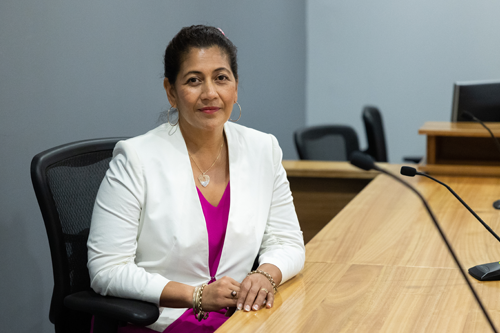Aidan Warren
Bachelor of Laws

Master of Laws, 1998
Dean Te Piringa Faculty of Law at University of Waikato

In 2022, Tafaoimalo Leilani Tuala-Warren was recognised as a Distinguished Alumni of the University of Waikato in recognition of her service to the communities of Samoa and New Zealand as a lawyer, commissioner and judge and for her constitutional work.
Professor Tafaoimalo Tologata Leilani Tuala-Warren has been appointed Dean of Te Piringa Faculty of Law at the University of Waikato, becoming New Zealand’s first Dean of law of Pacific descent.
Supreme Court Justice of Samoa, Leilani Tuala-Warren, considers her work in protecting constitutional law during the recent Samoan political crisis a highlight. While being a judge was not part of her career plan, Leilani says the role has a welcome advantage in that it has drawn her closer to the community.
In 2005 she returned home to Samoa, and the welcome support of family, to work for with her brother in their law firm, Tuala & Tuala. The move home to Samoa triggered an unexpected path for Leilani. In 2008, she was appointed the first Executive Director of the Samoa Law Reform Commission. Just five years later, Chief Justice Patu Tiavaasue Falefatu Maka Sapolu invited her to become a judge of the District Court, and in doing so she became the second woman in Samoa appointed to the bench. As a newly appointed judge, Leilani was asked to establish the Family Court and the Family Violence Court, the only court of its kind in the Pacific outside of New Zealand.
The Family Violence Court is a therapeutic court where the process is holistic and focuses on the whole family, including offenders and victims. “I found this work really rewarding, and enjoy working with the families - they want to heal together, and it’s a process that works well in this country.”
In 2016 Leilani left the Family Violence Court to become a Justice of the Supreme Court of Samoa where she deals with serious offences and constitutional cases. “Because it is not a therapeutic court and the seriousness of the offences we deal with, the role gets quite heavy.”
In 2021, Leilani and her fellow Supreme Court judges were faced with a constitutional crisis during the Samoa election when two rival leaders were in a deadlock over who was the rightful prime minister, with a resolution found through the Supreme Court and through scrutiny of the constitution. Leilani and her colleagues were in the position of strengthening the rule of law, which she found to be a meaningful moment in her career. “We spent a lot of time reading and writing. It lifted me and I thought, ‘this is why I am here’.”
The experience proved that the rule of law in Samoa is strong and that the judiciary is a protector of the Constitution, and Leilani feels that the crisis helped the community gain a better understanding of the law. “It’s been educational for our people because everyone had an interest in who would govern the country.”
Her advice to the next generation of lawyers is, “Ask yourself, ‘what can I do to help our people?’ That’s where the passion will come from, and from there you will do well.”

You’re currently viewing the website as a domestic student, you might want to change to international.
You're a domestic student if you are:
You're an International student if you are: